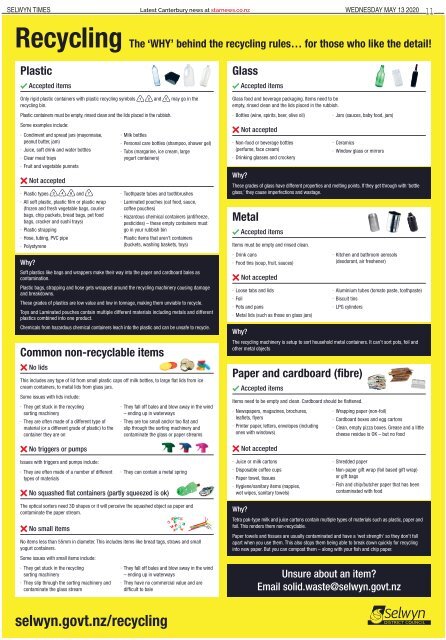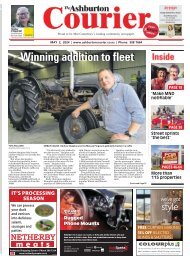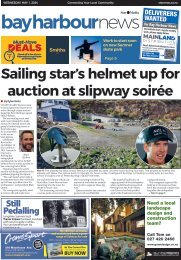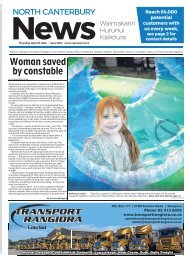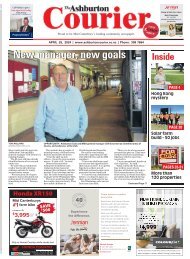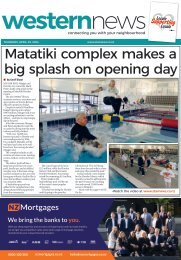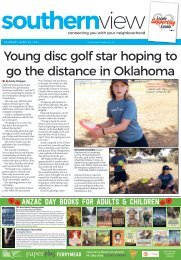Selwyn Times: May 13, 2020
Create successful ePaper yourself
Turn your PDF publications into a flip-book with our unique Google optimized e-Paper software.
SELWYN TIMES Latest Canterbury news at starnews.co.nz<br />
Wednesday <strong>May</strong> <strong>13</strong> <strong>2020</strong> 11<br />
Recycling The ‘WHY’ behind the recycling rules… for those who like the detail!<br />
Plastic<br />
Accepted items<br />
Only rigid plastic containers with plastic recycling symbols 1 2 and 5 may go in the<br />
recycling bin.<br />
Plastic containers must be empty, rinsed clean and the lids placed in the rubbish.<br />
Some examples include:<br />
· Condiment and spread jars (mayonnaise,<br />
peanut butter, jam)<br />
· Juice, soft drink and water bottles<br />
· Clear meat trays<br />
· Milk bottles<br />
· Personal care bottles (shampoo, shower gel)<br />
· Tubs (margarine, ice cream, large<br />
yogurt containers)<br />
· Fruit and vegetable punnets<br />
Not accepted<br />
· Plastic types 3 4 6 and 7<br />
· All soft plastic, plastic film or plastic wrap<br />
(frozen and fresh vegetable bags, courier<br />
bags, chip packets, bread bags, pet food<br />
bags, cracker and sushi trays)<br />
· Plastic strapping<br />
· Hose, tubing, PVC pipe<br />
· Polystyrene<br />
Why?<br />
· Toothpaste tubes and toothbrushes<br />
· Laminated pouches (cat food, sauce,<br />
coffee pouches)<br />
· Hazardous chemical containers (antifreeze,<br />
pesticides) – these empty containers must<br />
go in your rubbish bin<br />
· Plastic items that aren’t containers<br />
(buckets, washing baskets, toys)<br />
Soft plastics like bags and wrappers make their way into the paper and cardboard bales as<br />
contamination.<br />
Plastic bags, strapping and hose gets wrapped around the recycling machinery causing damage<br />
and breakdowns.<br />
These grades of plastics are low value and low in tonnage, making them unviable to recycle.<br />
Toys and Laminated pouches contain multiple different materials including metals and different<br />
plastics combined into one product.<br />
Chemicals from hazardous chemical containers leach into the plastic and can be unsafe to recycle.<br />
Common non-recyclable items<br />
No lids<br />
This includes any type of lid from small plastic caps off milk bottles, to large flat lids from ice<br />
cream containers, to metal lids from glass jars.<br />
Some issues with lids include:<br />
· They get stuck in the recycling<br />
sorting machinery<br />
· They are often made of a different type of<br />
material (or a different grade of plastic) to the<br />
container they are on<br />
No triggers or pumps<br />
· They fall off bales and blow away in the wind<br />
– ending up in waterways<br />
· They are too small and/or too flat and<br />
slip through the sorting machinery and<br />
contaminate the glass or paper streams<br />
Glass<br />
Metal<br />
Why?<br />
Accepted items<br />
Glass food and beverage packaging. Items need to be<br />
empty, rinsed clean and the lids placed in the rubbish.<br />
· Bottles (wine, spirits, beer, olive oil)<br />
Not accepted<br />
· Non-food or beverage bottles<br />
(perfume, face cream)<br />
· Drinking glasses and crockery<br />
Why?<br />
Accepted items<br />
Items must be empty and rinsed clean.<br />
· Drink cans<br />
· Food tins (soup, fruit, sauces)<br />
Not accepted<br />
· Loose tabs and lids<br />
· Foil<br />
· Pots and pans<br />
· Metal lids (such as those on glass jars)<br />
The recycling machinery is setup to sort household metal containers. It can’t sort pots, foil and<br />
other metal objects<br />
Paper and cardboard (fibre)<br />
Accepted items<br />
Items need to be empty and clean. Cardboard should be flattened.<br />
· Newspapers, magazines, brochures,<br />
leaflets, flyers<br />
· Printer paper, letters, envelopes (including<br />
ones with windows)<br />
Not accepted<br />
· Jars (sauces, baby food, jam)<br />
· Ceramics<br />
· Window glass or mirrors<br />
These grades of glass have different properties and melting points. If they get through with ‘bottle<br />
glass,’ they cause imperfections and wastage.<br />
· Kitchen and bathroom aerosols<br />
(deodorant, air freshener)<br />
· Aluminium tubes (tomato paste, toothpaste)<br />
· Biscuit tins<br />
· LPG cylinders<br />
· Wrapping paper (non-foil)<br />
· Cardboard boxes and egg cartons<br />
· Clean, empty pizza boxes. Grease and a little<br />
cheese residue is OK – but no food<br />
Issues with triggers and pumps include:<br />
· They are often made of a number of different<br />
types of materials<br />
· They can contain a metal spring<br />
No squashed flat containers (partly squeezed is ok)<br />
· Juice or milk cartons<br />
· Disposable coffee cups<br />
· Paper towel, tissues<br />
· Hygiene/sanitary items (nappies,<br />
wet wipes, sanitary towels)<br />
· Shredded paper<br />
· Non-paper gift wrap (foil based gift wrap)<br />
or gift bags<br />
· Fish and chip/butcher paper that has been<br />
contaminated with food<br />
The optical sorters need 3D shapes or it will perceive the squashed object as paper and<br />
contaminate the paper stream.<br />
No small items<br />
No items less than 55mm in diameter. This includes items like bread tags, straws and small<br />
yogurt containers.<br />
Some issues with small items include:<br />
· They get stuck in the recycling<br />
sorting machinery<br />
· They slip through the sorting machinery and<br />
contaminate the glass stream<br />
· They fall off bales and blow away in the wind<br />
– ending up in waterways<br />
· They have no commercial value and are<br />
difficult to bale<br />
Why?<br />
Tetra pak-type milk and juice cartons contain multiple types of materials such as plastic, paper and<br />
foil. This renders them non-recyclable.<br />
Paper towels and tissues are usually contaminated and have a ‘wet strength’ so they don’t fall<br />
apart when you use them. This also stops them being able to break down quickly for recycling<br />
into new paper. But you can compost them – along with your fish and chip paper.<br />
Unsure about an item?<br />
Email solid.waste@selwyn.govt.nz<br />
selwyn.govt.nz/recycling


